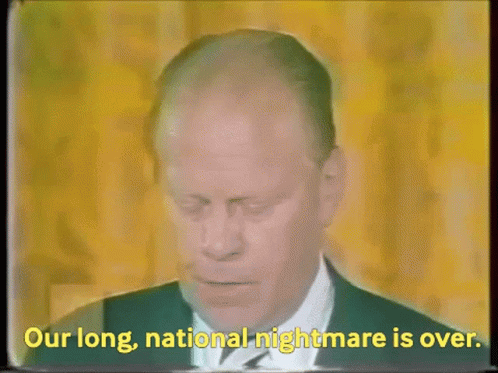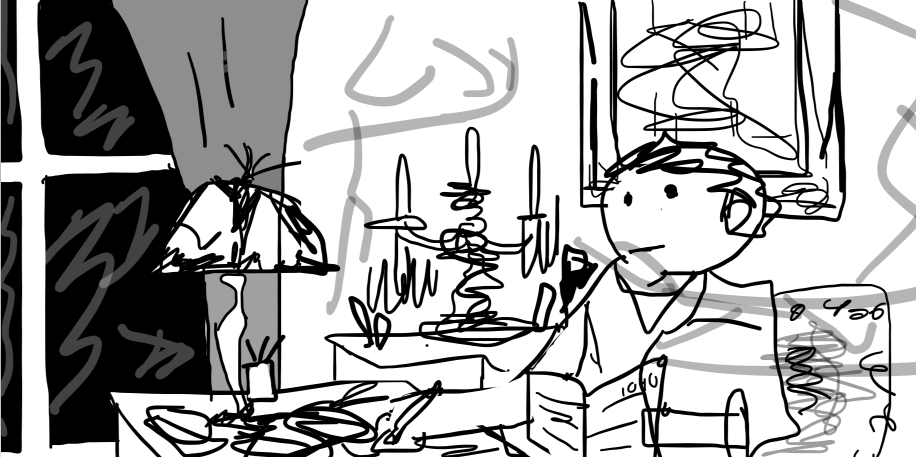The Last Chapter of The Bell Jar...Lots of questions, with few answers
"'We'll take up where we left off, Esther'
...
Is it a bad dream? Everything? Can all 6 months of Esther's harrowing journey be as fleeting, as ethereal, as...intangible...as a dream?
'We'll act as if all this were a bad dream.' A bad dream."
(Plath 237)
Ronald Reagan would be elected approximately 6 years after this speech.
Is it a bad dream? Everything? Can all 6 months of Esther's harrowing journey be as fleeting, as ethereal, as...intangible...as a dream?
In the future of Esther's life, how will she see the events of The Bell Jar? What will it mean to her? How will it tangibly affect her?
What happens to the past?
---
Is it starting where you left off?
Esther speaks to this idea of "starting, after a six months' lapse, where I had so vehemently left off" (Plath 236), and we know that her mother definitely wants Esther to do that, forgetting about the past and continuing with your life. Pretend that the past six months never happened, and move on down the path which you were originally on.
Yet, we know that can never really happen, as much as some may want to believe. Life lessons don't get drawn from nowhere. Memories of the past are always there, as fleeting as they are. And most importantly, the world is not the same as it was 6 months ago. Those you know are not the same as they were 6 months ago. And you are not the same as you were 6 months ago.
What is different, then?
What can we point at within Esther's new persona, and clearly show as an example of how she has changed in the past 6 months? Sometimes, these changes are opaque and inscrutable. Sometimes, they are obvious.
A good place to start would be how different the nature of the last chapter of the book is from the first. Take for instance, Esther's interactions with Buddy. She no longer has the vehement veiled hostility, which she described him at the beginning, signaling some form of change in attitude. In some way, being 6 months removed from Buddy has dampened any emotions related to him. Hence, we have the detached, almost awkward interaction with Buddy. Even the false friendliness between Esther and Buddy is gone. Buddy is aware that he won't be marrying Esther, and much of the conversation between Esther is about how her stay in the asylum affects their relationship. Buddy even thinks her breakdown is partly his fault (as a symbol of patriarchy, it actually kind of is Buddy's fault).
The past 6 months have also served to further entrench already nascent developments in her core identity. For example, Esther leans in on her aversion to marriage and childbearing in many ways in the last parts of the novel. She takes birth control, and then haves a one-night stand with a man, who she breaks contact with in the last chapter. Esther is presumably still going to college, meaning that the problem of her post-college future is still up in the air. With the experience of having burnt out over the summer, her career is even more uncertain than before.
Does Lifting the Bell Jar Only Put You Under a Larger Bell Jar?
Yet, for all that has changed, so much more remains unresolved. The metaphorical Bell Jar that trapped Esther is not simply that bout of mental breakdown, but all that feels wrong in her life. The patriarchal society that Esther lives in stifles her, no matter if it coincides with mental breakdown or not. No matter the circumstances, the same core issues still plague Esther. Esther even realizes this, musing that the "girls playing bridge and gossiping and studying in the college...sat under bell jars of a sort" (Plath 238). So, if the prerequisites for her breakdown, to an extent, still exist, is the novel's resolution a true new beginning, or merely a respite, like the eye of a hurricane? As Esther puts it, "How did I know that someday---at college, in Europe, somewhere, anywhere--- the bell jar, with its stifling distortions, wouldn't descend again?" (Plath 241).
What Will Esther Make of this Memory?
In another few months or years, when Esther moves on to a new life, having emerged out of her 6-month debacle, what will the memory of those events in The Bell Jar mean to her? In what way do they become her landscape?
Plath makes this question deliberately open-ended, providing few concrete examples to work off of. It's not like we can see into the future past the end of the book and cite a time where she recalls the memory of, say, Doreen, and adjusts her behaviors to learn from this lessons. But we can at least understand the concept of how it could change her. In a bid to avoid the worst parts of her past, she could be a bit more cautious here, or a bit more decisive there. She knows slightly more about what to do, where to go, and what not to do, where not to go, if she ever found herself in a situation like the one she once faced. Feel the worst kind of déjà vu.
Yet, for all that can be said about how her experiences may come back in the real world, maybe the most important element of memory remains in the ethereal world of the mind, drifting in and out of focus, a stark reminder of days which were worse (or maybe even better), of days lost, and what could've been, had everything never happened.



I really like the point you brought up about how lifting up the bell jar that her mental health was imposing on her only places her inside a bigger bell jar that other women are a part of. That statement about how those girls in her college dorm playing bridge are seemingly oblivious to the bell jars that they are under is particularly revealing; earlier in the novel, Esther was able to identify the gender double standard with how Buddy was allowed to sleep around, yet only she took problem with this while the girls in her college dorm felt that was completely normal and didn't give it a second thought. The fact that everyone is living under their own bell jars of societal expectations that they must live up surround their gender, class, etc. is an ominous thought.
ReplyDeleteI also wondered about what Esther is feeling after the book ends, because I think it's probably not a straight path up for the rest of her life. She's writing the story in the future where she has a kid, but we don't really know if she's totally happy or satisfied with her life. I love what you said about how the most important memory that will remain is the idea of what could've been if none of this had ever happened. Would Esther be happier, or would she inevitably fall into depression no matter what because of the society she lives in? I don't really know. Great post!
ReplyDeleteBooks with ambiguous endings are perhaps the most frustrating kind. I wish we could know how Esther is feeling after the book ends. We discussed in class that Sylvia Plath had planned on writing a sequel to the book before her death, so we were very close to being able to know what happens to Esther. We also talked about the idea of starting where you left off vs. being transformed through your experiences, and I like your take that Esther is not, in fact, in the same place she was as when she started her journey.
ReplyDeleteI definitely agree that Esther is not in the same place as she was originally when the novel started. Those 6 months changed her, whether she and her mom like it or not, and it will continue to play an important role in how she carries on after the novel ends. In order to continue living her life the way she wants, she will have to push through the cultural expectations set on women at the time. Those 6 months gave her a little bit of fight, but will it be enough? There's really no way to know, but I hope it is.
ReplyDeleteThis post looks at so much--and of the ~10 posts I've read this has to be the best written. You've discussed too many things to comment on all of them, but the idea of Esther looking back at her "Little Incident (which lasted 6 months)" after it's all over is almost irresistibly interesting. Personally I think that perhaps in between Lessons Learned she probably won't really know what to make of it. She'll look at that summer and think, "well, that happened," and keep it as a part of her story. Because there's a reason Plath wrote the novel for that specific period of time and not before or after: Esther knows it shaped her. Her behavior every single day is probably impacted by that. But perhaps she doesn't quite know how.
ReplyDeleteThis is a really deep post, and very well written. The point about bigger bell jars - like nesting dolls but horrible depression boxes - really made me think. Is every size of bell jar just exposing you to more people that feel different ways and giving you the chance to emphasize with them? Trapped in the smaller jars, you are forced to focus on yourself. Other's problems seem distant or even overwhelming depending on the person, and yet when the bell jar lifts and you can see their issues in a new light it's easier to see where their struggles align with yours, if at all.
ReplyDelete